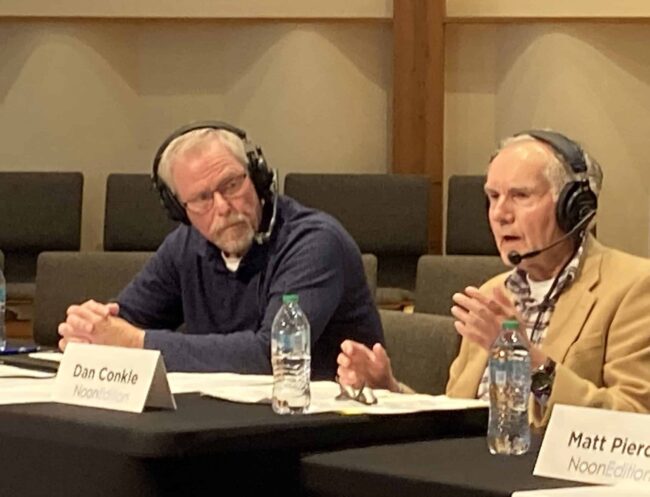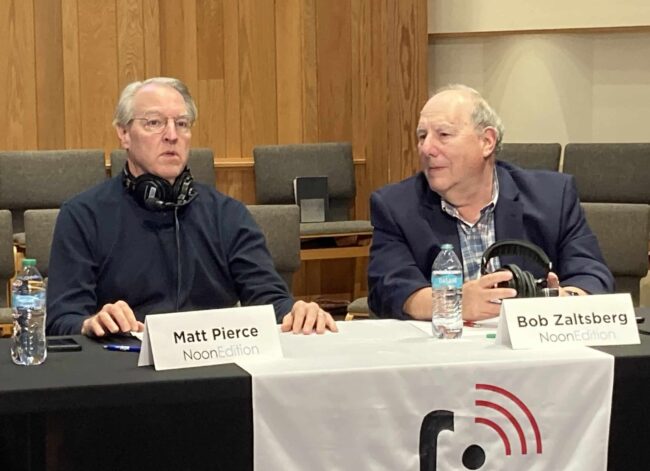
By Steven Hinnefeld
The Indiana Citizen
October 27, 2025
Searching for a way to counter the authoritarian Christian nationalism that is gaining strength in Indiana? Christian theology and values could be a good starting point, a speaker at a public radio-hosted forum suggested Friday.
“When I think of Christianity, I think almost the opposite of what I understand Christian nationalism to be,” said Bob Whitaker, senior pastor at Christ Evangelical Church in Bloomington. “I think of the beatitudes. I think of the life of Jesus. I think of the fact that Jesus gave a completely open invitation to follow him.”
Whitaker referred to comments by Lt. Gov. Micah Beckwith, who recently declared that “radical Democrat Marxists” are waging war on “our Constitution, our children and the future of this Republic” and by White House adviser Stephen Miller, who said the assassination of Republican activist Charlie Kirk had ignited a conservative fire that “burns with a righteous fury” against their “enemies.”
“Let me just suggest it would be inconceivable for Jesus Christ to utter those words,” Whitaker said. “And if Christian nationalism is that, then it’s no longer Christian.”
The comment drew hearty applause from the approximately 75 people at a live presentation of WFIU radio’s “Noon Edition” program at Bloomington’s Unitarian Universalist Church. The program marked the launch of a four-part podcast series on Christian nationalism, “Red, White and Righteous,” from Indiana Public Media, which includes WFIU radio and WTIU television.
Panelists, in addition to Whitaker, were Dan Conkle, professor emeritus of law at the Indiana University Maurer School of Law, and state Rep. Matt Pierce, D-Bloomington. Bob Zaltsberg, an editor for Indiana Public Media and host of “Noon Edition,” moderated.
While Christian nationalism is much in the news, the panelists said it’s not easily defined. The term can refer to anything from theocratic rule to the idea that religious values should influence public policy. Even Beckwith, an avowed Christian nationalist, sometimes blurs the lines. In the “Red, White and Righteous” podcast, he says that advocating for a Christian theocracy is something “which I’ve never said nor do I want.” But he also argues that the U.S. is a Christian nation founded on Judeo-Christian principles and Christianity should have influence that other beliefs should not.

Conkle, a constitutional law expert, said there’s truth to Beckwith’s claim that America’s founders were Christians who believed religious values were important. Religious claims were made for and against slavery, he noted. The Social Gospel movement of the late 1800s and early 1900s applied religious values to issues like poverty, women’s rights and temperance. In the civil rights movement, the Rev. Martin Luther King Jr. and other leaders, many of them pastors, used religious language and values to advocate for equality.
But the founders, Conkle said, believed the institutions of government and religion should be separate. The message of the Constitution, he said, is “Values yes, institutional linkage no.” He added: “I don’t really think of the Christian nationalism problem as distinctive from the general drift toward authoritarianism. To me, the biggest threat to the country is authoritarianism and rejection of longstanding constitutional norms.”

Pierce, a legislator since 2002, described how Christian nationalism has gained influence in state government. This year, 21 representatives co-authored a resolution that called for the Indiana House to “humbly submit its ways to the Lord, Jesus Christ” and uphold “biblical principles.” The measure, introduced late in the session, died without a committee hearing.
Pierce attributed much of the trend to Indiana’s gerrymandered election districts, which ensure that only a handful of races are competitive between Democrats and Republicans.
“In most of the districts today, and I will include mine, which is 70% Democratic, the primary is going to determine whether you go back or not. The general election is just kind of a pro forma thing,” he said.
Primary voters are reliable and activist voters, Pierce said. So are state convention delegates, who picked Beckwith in 2024 over Gov. Mike Braun’s choice for lieutenant governor. “There’s a strong strain of Christian nationalism within the Republican Party,” he said. “Therefore, the elected officials who want to get reelected are going to respond to that.
Pierce said both Republicans and Democrats increasingly want to elect “warriors” who will fight for their values. He said the old idea that lawmakers should represent all their constituents, work hard and get things done is passe: “You don’t really get rewarded these days if you say I’m going to work with the other side,” he said.
Asked by an audience member whether Democrats should vote in Republican primaries to choose more moderate candidates, Pierce rejected the idea. “We have the lowest voter turnout in, like, the universe in Indiana,” he said. “Half the people are not voting. I think it would be better to go out and find friends and neighbors who aren’t engaged and persuade them to go and vote.”
The audience in liberal Bloomington rejected Christian nationalism, sometimes groaning or laughing at positions attributed to Beckwith and other Republicans. Elsewhere, as Zaltsberg noted, things are different. Some 65% of Hoosiers identify as Christians, while 31% are religiously unaffiliated and fewer than 1% are Jewish or Muslim. In the United States, half of adults say the Bible should have at least some influence in government decisions.
Whitaker, whose church is situated in the evangelical movement, said his congregation includes members on the far right, the far left and everywhere between. It can be a balancing act, he said, to preach a biblical message that includes serving the poor and welcoming the stranger in the context of an orthodox Christian organization. He said he tries to avoid politics in the pulpit and focus on changing hearts.
“It’s just hard work,” he said. “It’s like tending soil.”
Audio of the “Noon Edition” program and Part 1 of the “Red, White and Righteous” podcast can be heard online. Additional podcast episodes will be posted Oct. 30, Nov. 6 and Nov. 13.
Steve Hinnefeld is a freelance writer based in Bloomington. He formerly was an adjunct instructor at the Media School at Indiana University, a media specialist at Indiana University and reporter for the Bloomington Herald-Times.
Dwight Adams, an editor and writer based in Indianapolis, edited this article. He is a former content editor, copy editor and digital producer at The Indianapolis Star and IndyStar.com, and worked as a planner for other newspapers, including the Louisville Courier Journal.
The Indiana Citizen is a nonpartisan, nonprofit platform dedicated to increasing the number of informed and engaged Hoosier citizens. We are operated by the Indiana Citizen Education Foundation, Inc., a 501(c)(3) public charity. For questions about the story, contact Marilyn Odendahl at marilyn.odendahl@indianacitizen.org.